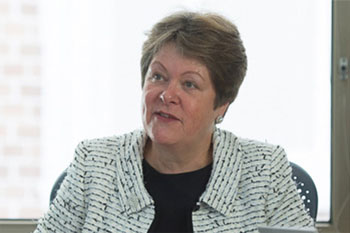Baroness Brown of Cambridge, chair of the Climate Change Committee (CCC)’s Adaptation Committee, has given her support to highly personalised road user charging, suggesting it could be in line with wider trends in the insurance sector.
The peer - also known as Professor Dame Julia King - was responding to questions after her presentation to the Chartered Institution of Highways and Transportation (CIHT).

Baroness Brown of Cambridge
She argued that public attitudes have changed on this issue and that road user charging would be a ‘fair’ way to handle motoring taxation after the phasing out of diesel and petrol vehicles.
President of the CIHT Martin Tugwell asked her: ‘I know that the Transport Select Committee has an enquiry around road charging and the role of EVs. There is clearly a great change happening and we will probably have to think differently about the business model around how we invest and use roads. Is that something that the committee on climate change has been looking at?’
Baroness Brown responded: ‘[Road user charging] is something we were keen on back in the King Review (2007). We were very keen to propose replacing taxes associated with driving with a time, distance, place, emissions, occupancy [charge] – whatever you like now because we can so easily monitor these things. It could be an enormously fair way to treat people.
‘It seems to me that you can have a system that takes emissions into account and that would be fairer to everyone. We are now seeing the insurance companies looking at having this system for charging you based on how and where and when you drive. So this kind of monitoring is coming. At the time of the King review, people were shocked by the idea of the intrusion in privacy, but I think we have moved an awful long way to thinking some of these ideas might be acceptable.’
In her presentation Baroness Brown, outlined details of how the UK can deliver its 2050 net zero carbon emissions.
Her talk came after the CCC proposed its sixth carbon budget last December, the first to have been calculated and proposed to Parliament since the net zero legislation was passed.
Baroness Brown argued that the UK needs to take action in four key areas: reducing demand and improving efficiency, encouraging the take-up of low carbon solutions, developing more zero-carbon electricity production and offsetting emissions.
‘The Committee on Climate Change estimates about £50bn a year of investment will be needed [for the transition to zero net carbon]. The huge majority of that is private sector investment. Something like £10bn to £20bn might need to come from the Government in the early years.
‘Surface transport is one of the smaller areas for investment at around £10bn a year and a lot of that will be people and business buying electric vehicles. One thing transport has that a lot of areas don’t is the savings in operating costs because batteries are so much more efficient than internal combustion engines. There are huge cumulative savings in operating costs which outweigh the capital costs upfront.’
She added: ‘We do need to act with urgency. At the moment we have about 25,000 public charging points. Some people estimate we will need 150,000 within the next four years. By 2035 we will need around 400,000 public charging points.’
Register now for full access
Register just once to get unrestricted, real-time coverage of the issues and challenges facing UK transport and highways engineers.
Full website content includes the latest news, exclusive commentary from leading industry figures and detailed topical analysis of the highways, transportation, environment and place-shaping sectors.
Use the link below to register your details for full, free access.
Already a registered? Login